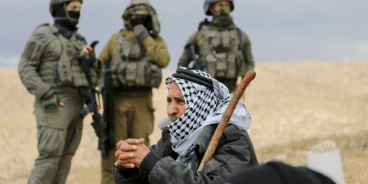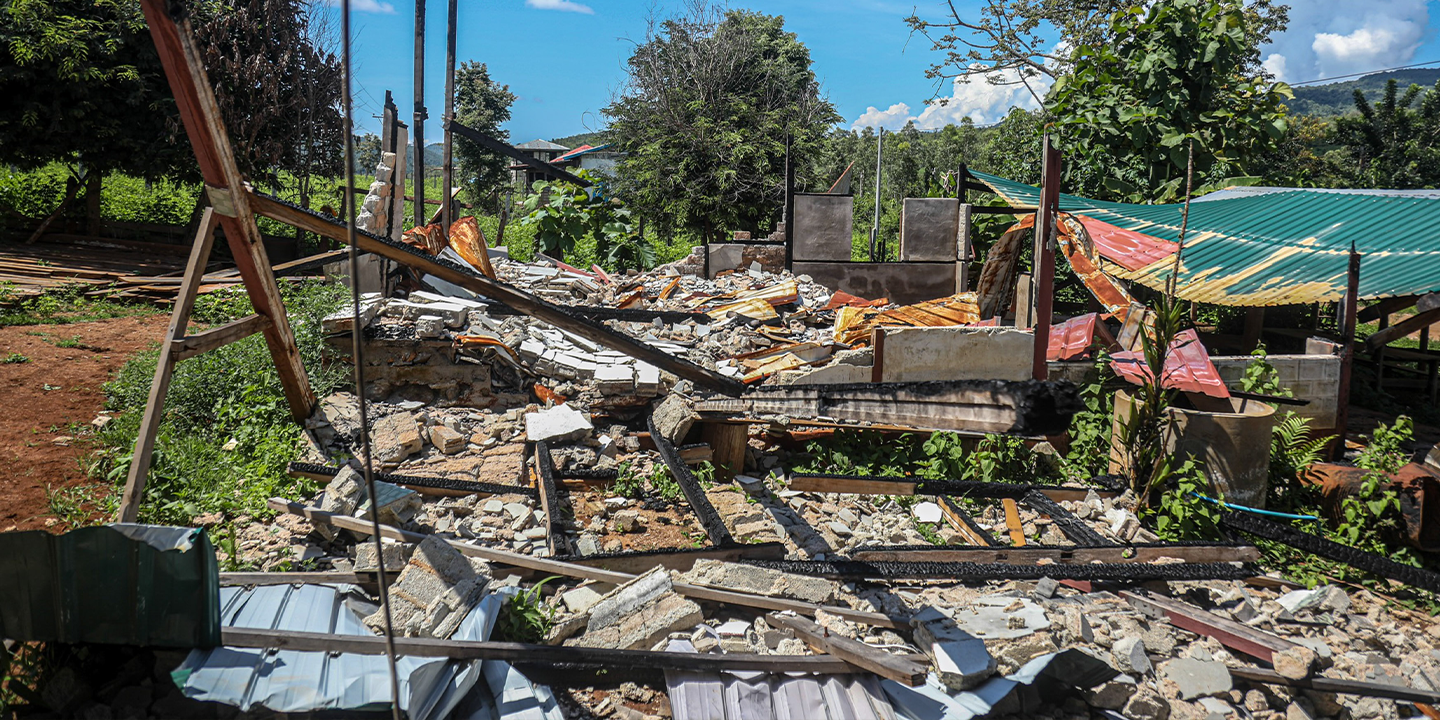

Atrocity Alert No. 323: Myanmar (Burma), Sudan and Democratic Republic of the Congo
Atrocity Alert is a weekly publication by the Global Centre for the Responsibility to Protect highlighting situations where populations are at risk of, or are enduring, mass atrocity crimes.
MILITARY AIRSTRIKE KILLED AT LEAST 80 PEOPLE IN MYANMAR’S KACHIN STATE
On 23 October Myanmar’s (Burma) military – the Tatmadaw – bombed a concert in Hpakant Township, Kachin State, killing at least 80 people and injuring over 100 in what appeared to be the single-worst air attack since the February 2021 coup. The Tatmadaw launched airstrikes on a musical performance, which was organized by the opposition Kachin Independence Organization as part of a three-day celebration commemorating the organization’s 62nd anniversary. The concert was held at a base also used for military training by the Kachin Independence Army (KIA), the organization’s armed wing. The airstrike on hundreds of concertgoers likely amounts to a war crime as International Humanitarian Law prohibits attacks that result in indiscriminate or disproportionate civilian harm.
The attack was widely condemned by the international community. The UN Office in Myanmar stressed, “What would appear to be excessive and disproportionate use of force by security forces against unarmed civilians is unacceptable and those responsible must be held to account.” Envoys representing diplomatic missions in Myanmar, including Australia, the United Kingdom, United States and European Union, issued a joint statement saying that the attack “underscores the military regime’s responsibility for crisis and instability in Myanmar and the region and its disregard for its obligation to protect civilians and respect the principles and rules of international humanitarian law.” The UN Special Rapporteur on the situation of human rights in Myanmar, Tom Andrews, questioned, “How many atrocities will it take for the world to cut off the junta’s capacity to commit these horrific acts?”
There have been rebellions by ethnic minority groups seeking independence in Myanmar for decades. Notably, the KIA – one of the stronger ethnic armed groups – have clashed regularly with the Tatmadaw. Following last year’s military coup, anti-government resistance significantly increased across the country, with armed pro-democracy movements and ethnic armed groups clashing with the Tatmadaw. Since the coup, the Tatmadaw has targeted civilian areas with airstrikes, scorched earth campaigns and other attacks, particularly in opposition strongholds. This latest deadly bombing underscores how the military has increasingly turned to air attacks as it struggles to control the country.
Tomorrow, 27 October, the Association of Southeast Asian Nations (ASEAN) will hold a special meeting on Myanmar to consider the peace process. ASEAN must move beyond the ineffective “Five-Point Consensus” and take more substantial action to protect Myanmar’s people. In light of the military’s escalating repression, the international community must block the sale of arms and aviation fuel to Myanmar to hinder the military’s capacity to perpetrate atrocities. The UN Security Council should urgently consider imposing an arms embargo on Myanmar and targeted sanctions on military officials and the country’s oil and gas sector.
HUNDREDS OF PEOPLE KILLED IN RENEWED INTER-COMMUNAL VIOLENCE IN SUDAN
Fighting between the Hausa and Berti communities in Blue Nile State, Sudan, erupted earlier this month following a dispute over land ownership. The situation escalated further on 19 and 20 October in Wad al Mahi locality and, according to the UN Office for the Coordination of Humanitarian Affairs, unconfirmed reports indicate that an estimated 250 people were killed, 572 injured and 7,000 displaced. On 20 October the UN Humanitarian Coordinator ad interim, Eddie Rowe, expressed deep concern and warned that there is “a risk of an escalation and spread of the fighting with additional humanitarian consequences.”
The fighting in Wad al Mahi stems from violent clashes earlier in July between the Hausa and Berti communities in Ar Rusyaris locality, Blue Nile State, when 149 people were killed. The clashes erupted following the rejection of a Hausa request to create a “civil authority to supervise access to land.” While troops were deployed to the area to restore stability, Sudan’s military and ex-rebel leaders have been accused of exploiting inter-communal tensions for personal gain. The ongoing situation marks one of the deadliest episodes of inter-communal violence in Blue Nile State in recent years.
Inter-communal violence in the Blue Nile, Darfur and Kordofan regions has dramatically increased since the military launched a coup in Sudan one year ago. Political instability and the re-deployment of security forces to Khartoum and other cities has created a security vacuum in Darfur and other peripheral regions, leaving communities vulnerable to attack and enabling the resurgence of inter-communal violence.
The political crisis in Sudan has continued since the 25 October 2021 coup, with weekly mass demonstrations taking place across the country. Sudanese security forces have used excessive and deadly force in response to the protests, killing at least 118 people and injuring hundreds of others. Protesters have also been subjected to sexual and gender-based violence – including abuse and gang rape – tortured, arbitrarily arrested and forcibly disappeared. On Tuesday, the one year anniversary of the coup, a group of UN human rights experts emphasized that, “If these atrocities are not addressed, if victims are once again denied justice and reparations, and if the voices of protesters are not heard, Sudan’s cycle of political turmoil and brutal repression will continue.”
The Sudanese authorities must urgently implement the National Plan for the Protection of Civilians and all provisions of the Juba Peace Agreement to provide safety and security for civilians in the Blue Nile, Darfur and Kordofan regions and advance peacebuilding efforts. The Sudanese authorities must also engage constructively in ongoing political negotiations and work toward establishing a civilian-led transition that respects the people’s desire for democracy.
VIOLENT CLASHES RESUME BETWEEN DR CONGO ARMY AND M23 ARMED GROUP
After several weeks of relative calm, on 20 October intense clashes renewed between the Democratic Republic of the Congo’s (DRC) army (FARDC) and fighters from the armed group, March 23 Movement (M23), in Rutshuru Territory, North Kivu Province. The unrest initially broke out in Rangira locality then spread to other villages in the Jomba group, as well as the Bweza and Busanza groups, near the borders of Uganda and Rwanda. Since the resumption of fighting, there have been reports of the use of heavy weapons and explosive weapons, including mortar fire and artillery shelling. The explosion of a shell dropped by M23 reportedly hit a market in Rangira on 22 October. At least four civilians have been killed and 40 injured, including children, by the violence in Rutshuru so far.
On 23 October M23 fighters reportedly captured Ntamugenga village. In a statement the FARDC indicated that troops continue to fight the armed group, adding that civilian casualties have occurred in the area. As the clashes have escalated in Ntamugenga, an estimated 500 people, some of them injured, have sought shelter in a convent in the village. The majority of inhabitants in neighboring villages have been forced to flee due to gunfire. At least 34,500 people are estimated to have been displaced since 20 October, including 6,500 people who have fled to Uganda. According to the UN Office of the Coordination of Humanitarian Affairs, the escalation in hostilities will impede humanitarian access to vulnerable populations across Rutshuru.
Since the resurgence of M23, civilians and critical civilian infrastructure, such as schools and health centers, have faced increased risk due to the use of explosive weapons, including mortar fire and artillery shelling, by the FARDC and M23. Over the past year, M23 has committed widespread abuses against civilians, including deliberate killings and indiscriminate shelling, among other possible war crimes. Human Rights Watch has also documented myriad abuses perpetrated by local armed groups backed by FARDC units and at times by FARDC soldiers, including unlawful killings, sexual violence and theft, during their fight against M23.
Christine Caldera, DRC expert at the Global Centre for the Responsibility to Protect, said that, “The latest resumption in fighting is having devastating consequences for the civilians caught in the middle. All parties to the conflict should minimize civilian harm during clashes and uphold their obligations under International Humanitarian Law, including restricting the use of explosive weapons with wide area effects in populated areas.” The DRC government should implement a vetting process within the FARDC and other security services to identify and provisionally remove individuals who may have been implicated in serious human rights violations while cases are pending. A humanitarian corridor should be urgently established in Ntamugenga to evacuate civilians and those injured.
Related Content


Atrocity Alert No. 445: Sudan, Syria and Eritrea
